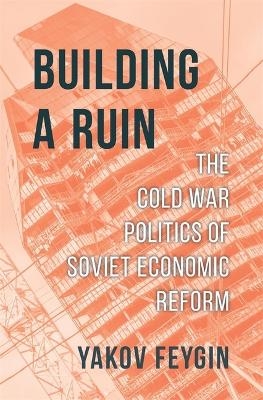
Building a Ruin
The Cold War Politics of Soviet Economic Reform
Seiten
2024
Harvard University Press (Verlag)
978-0-674-24099-5 (ISBN)
Harvard University Press (Verlag)
978-0-674-24099-5 (ISBN)
Yakov Feygin argues that Soviet decline owes much to internal tensions over economic reform. Focused on socioeconomic competition with the West, Khrushchev and his successors sought to build a consumer society but had only Stalinist institutions of mass mobilization to work with, resulting in unresolvable contradiction and eventual sclerosis.
A masterful account of the global Cold War’s decisive influence on Soviet economic reform, and the national decay that followed.
What brought down the Soviet Union? From some perspectives the answers seem obvious, even teleological—communism was simply destined to fail. When Yakov Feygin studied the question, he came to another conclusion: at least one crucial factor was a deep contradiction within the Soviet political economy brought about by the country’s attempt to transition from Stalinist mass mobilization to a consumer society.
Building a Ruin explores what happened in the Soviet Union as institutions designed for warfighting capacity and maximum heavy industrial output were reimagined by a new breed of reformers focused on “peaceful socioeconomic competition.” From Khrushchev on, influential schools of Soviet planning measured Cold War success in the same terms as their Western rivals: productivity, growth, and the availability of abundant and varied consumer goods. The shift was both material and intellectual, with reformers taking a novel approach to economics. Instead of trumpeting their ideological bona fides and leveraging their connections with party leaders, the new economists stressed technical expertise. The result was a long and taxing struggle for the meaning of communism itself, as old-guard management cadres clashed with reformers over the future of central planning and the state’s relationship to the global economic order.
Feygin argues that Soviet policymakers never resolved these tensions, leading to stagnation, instability, and eventually collapse. Yet the legacy of reform lingers, its factional dynamics haunting contemporary Russian politics.
A masterful account of the global Cold War’s decisive influence on Soviet economic reform, and the national decay that followed.
What brought down the Soviet Union? From some perspectives the answers seem obvious, even teleological—communism was simply destined to fail. When Yakov Feygin studied the question, he came to another conclusion: at least one crucial factor was a deep contradiction within the Soviet political economy brought about by the country’s attempt to transition from Stalinist mass mobilization to a consumer society.
Building a Ruin explores what happened in the Soviet Union as institutions designed for warfighting capacity and maximum heavy industrial output were reimagined by a new breed of reformers focused on “peaceful socioeconomic competition.” From Khrushchev on, influential schools of Soviet planning measured Cold War success in the same terms as their Western rivals: productivity, growth, and the availability of abundant and varied consumer goods. The shift was both material and intellectual, with reformers taking a novel approach to economics. Instead of trumpeting their ideological bona fides and leveraging their connections with party leaders, the new economists stressed technical expertise. The result was a long and taxing struggle for the meaning of communism itself, as old-guard management cadres clashed with reformers over the future of central planning and the state’s relationship to the global economic order.
Feygin argues that Soviet policymakers never resolved these tensions, leading to stagnation, instability, and eventually collapse. Yet the legacy of reform lingers, its factional dynamics haunting contemporary Russian politics.
Yakov Feygin is an economic historian and policy analyst at the Center for Public Enterprise and the Jain Family Institute. Formerly associate director of the Future of Capitalism program at the Berggruen Institute, he has written for Foreign Policy, Bloomberg, Financial Times, Phenomenal World, and Noema.
| Erscheinungsdatum | 29.05.2024 |
|---|---|
| Zusatzinfo | 8 illus., 5 tables |
| Verlagsort | Cambridge, Mass |
| Sprache | englisch |
| Maße | 156 x 235 mm |
| Gewicht | 577 g |
| Themenwelt | Geisteswissenschaften ► Geschichte ► Regional- / Ländergeschichte |
| Geschichte ► Teilgebiete der Geschichte ► Wirtschaftsgeschichte | |
| Sozialwissenschaften ► Politik / Verwaltung ► Politische Systeme | |
| Sozialwissenschaften ► Politik / Verwaltung ► Politische Theorie | |
| Wirtschaft ► Volkswirtschaftslehre ► Wirtschaftspolitik | |
| ISBN-10 | 0-674-24099-5 / 0674240995 |
| ISBN-13 | 978-0-674-24099-5 / 9780674240995 |
| Zustand | Neuware |
| Informationen gemäß Produktsicherheitsverordnung (GPSR) | |
| Haben Sie eine Frage zum Produkt? |
Mehr entdecken
aus dem Bereich
aus dem Bereich
Macht und Herrschaft im Zarenreich
Buch | Hardcover (2024)
C.H.Beck (Verlag)
49,90 €
wie die USA und China um die technologische Vorherrschaft auf der …
Buch | Hardcover (2023)
Rowohlt (Verlag)
30,00 €


